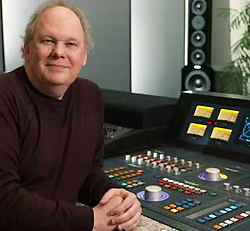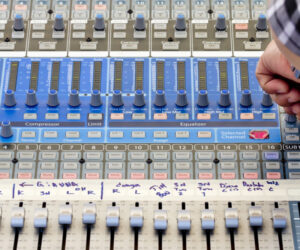People who work behind the scenes in the music business rarely receive public adulation. But Bob Ludwig, owner of Gateway Mastering & DVD in Portland, Maine, is a legitimate star in the world of music production, considered by many to be the best mastering engineer in the world.
Ludwig’s career spans more than 40 years and some of the all-time biggest records, including AC/DC’s “Back in Black,” Rush’s “Moving Pictures,” and Journey’s “Escape.” Ludwig has also worked with Led Zeppelin, The Who, Paul McCartney, Tony Bennett, Phish and classical composers Steve Reich and John Adams.
With a name as well known as many of his clients, audiophiles have learned Ludwig’s name through his vast amount of album credits and his love of high-performance audio equipment.
Ludwig recently took time away from his schedule to explain to CE Pro why the Mastered for iTunes initiative is a good thing for digital music fans, and why Metallica’s “Death Magnetic” album marked the peak of the loudness wars.
Is it harder today than in the past to perform your job?
Yes. The immense amount of layoffs in the diminished record companies means either there is one person doing what two or even three people used to do, and there is less patience all around. Also, sometimes the people who have been left on staff don’t know what they are doing. We have to spend so much effort trying to educate people. The production people responsible for coordinating the CD, vinyl and download productions sometimes ask us, “what should I order?”
Is it the music industry’s desire to make music “louder?” Or are loudness levels different because of the performance traits of each mode (CD, vinyl, downloads) of music delivery?
The loudness wars have not been as severe ever since Metallica’s “Death Magnetic” according to the thousands of fans who formed a petition on the Internet for them to remix the album. That album set the bar for loudest record with bad sound.
A good mastering engineer finds the narrow ‘sweet spot’ between great energy and fulfilling dynamics. It is the artist’s record and they deserve to achieve their vision. When the artist decided they want a recording louder than I think it should be, it is very discouraging for me. Glyn Johns and Jack White are my heroes right now as they are willing to issue their music with full dynamic range with no regard for the level wars, it is a wonderful thing.
No. The format plays no part.
What do you think of Apple’s “Mastered for iTunes” initiative? Is it a marketing ploy or is there some legitimacy to it?
There is more than ‘legitimacy’ to it … it is pure science and it makes every album sound better, sometimes remarkably better than the old ingest process. Apple is righting a wrong that has existed for years by delivering tools that can measure clipping caused by the AAC encoding process, quantifying that and making it possible to eliminate encoding clips and the distortion they can yield.
More importantly, the 32-bit float AAC encoding software is being fed from a 24-bit master instead of a 16-bit CD. I think encoding from 24-bit masters yields a more positive improvement over encoding from 16-bit CDs than the improvement of 96khz sampling rate to 44.1kHz, although that is indeed helpful as well.
Will the ITU’s (International Telecommunications Union) loudness standards have an impact on how music is mastered?
It will in Europe where broadcasters will now show producers and record companies that their crushingly loud records will only be turned down in level to the ‘center of gravity’ established by the broadcasters and now dynamic records will really stand out on the air. There are no laws in the U.S. for this at the moment for radio stations; only TV stations.
iTunes “Sound Check” and the BS 1770-2 recommendation for other music server companies can indeed help end the loudness war. If Apple would only allow the possibility to have an entire album carry a single Sound Check value. If Sound Check were to work in this manner and if it was turned on by default, dynamic music will sound much better than squished recordings and yet an album would maintain the correct level from song to song – the quiet middle movements of a concerto would remain quiet in comparison to the louder movements. Without the ability to have a unified ‘Sound Check’ level for an album it presently undoes part of my job to make the levels flow correctly.















